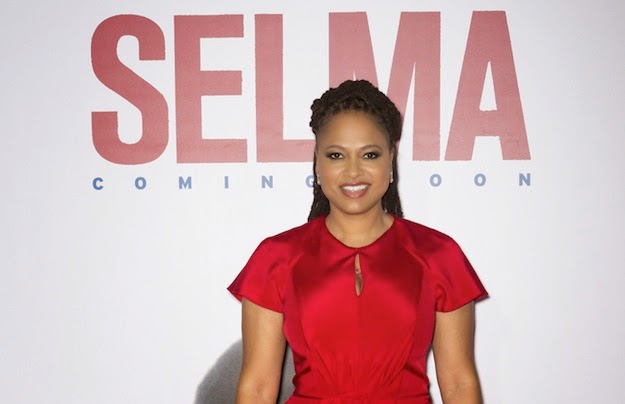On Ava DuVernay and the Neglect of the Black Woman Film Director

by Raisa Habersham
The second opening scene of Selma is a poignant one.
We’re introduced to four little girls, walking down the stairs of church basement. As they descend, they discuss how they envy the refined hairstyle of Coretta Scott King. Then there is a blast. As the dust settles, you see the girls’ lifeless bodies partially buried in the rubble.
This, of course, is a depiction of the heinous bombing of the 16th Street Baptist Street Church that occurred on September 15, 1963 in Birmingham, Alabama. It was one of the most crucial turning points for the Civil Rights Movement.
This is one of many standout scenes in Selma, which showcases Ava DuVernay’s talent for creating fully human and emotionally nuanced depictions of legendary historical events. This talent is why many of us cannot fathom how she was overlooked for an Best Director Academy Award nomination, especially since the film has been nominated within the Best Picture category.
Let’s look at the facts: The Academy is 93 percent white and 76 percent male and the average age of the voting body is 63 years old. We know old boys’ clubs operate. It should also be noted that this year’s Oscar nominations are the whitest they’ve been since 1998, when not one person of color was nominated for an Oscar. While diversity in nominations have increased (if you call it that), it still seems as though the Academy has adopted a “one black person and/or movie at a time” rule with selecting award winners, which is tokenistic.
Simply put: If you don’t fit within the white male majority, you don’t belong. You particularly don’t belong if you aren’t afraid to defend your work. It’s no surprise that many also feel DuVernay’s well-researched film depicts President Lyndon Johnson in negative light, which may have played a factor in her being overlooked for a Best Director nod.
While this is upsetting, DuVernay’s Oscar dismissal speaks to a larger issue: Black women directors are consistently ignored when award season rolls around. Had DuVernay been nominated, she would have been the first black woman in the Oscars 87 year history to be nominated for this award.
Let that marinate.
While the snub doesn’t surprise me (the Academy doesn’t do much to hide its position on diversity), it is clear black women creatives are least appreciated in the realm of directing.
Take Dee Rees and her film Pariah about a young black female coming to terms with her sexuality. The movie was praised for its unique story and Rees does a beautiful job capturing the heart of each character, but save nominations from Black institutions, the movie was largely ignored by mainstream awards ceremonies.
This isn’t merely a situation of wanting white approval, nor is this a case of valuing white acceptance over anything else. This is about having our stories receiving the same recognition and respect that they undoubtedly would if the only thing that changed was our skin color.
The answer that criticisms of this year’s Academy Award nominations have received is, “Well, Lupita Nyong’o won Best Supporting Actress last year. And 12 Years a Slave received Best Adapted Screenplay and Best Picture.”
While Lupita’s win was certainly noteworthy and deserved, it does not change the fact that Black women producers and directors are still largely invisible. More visibility of Black actresses does not replace the need for us to make space for and acknowledge the accomplishments of Black creatives behind the camera. After all, it was two black males who took home the awards for 12 Years a Slave’s Adapted Screenplay and Best Picture wins last year—screenwriter John Ridley and director and producer Steve McQueen.
Ava DuVernay, Dee Rees, and Gina Prince-Bythewood deserve the same respect that their black male peers and white counterparts receive within the world of exceptional cinema. They, like many of us, are working twice as hard in their field to be neglected by those who do half the work.
Failing to notice black women directors shows the “peer-to-peer” process by which the Academy votes is heavily biased, and not at all interested in “moving the subject of diversity forward," or “increas[ing] membership and the recognition of talent," as Cheryl Boone Isaacs recently stated.
If anything, it encourages a “shut up and be thankful” mentality. And we’re sick and tired of it.
Photo: Ovidiu Hrubaru / Shutterstock
Raisa Habersham is a regular contributor at For Harriet.

No comments: